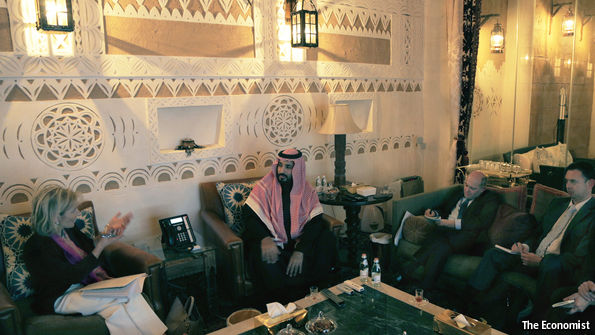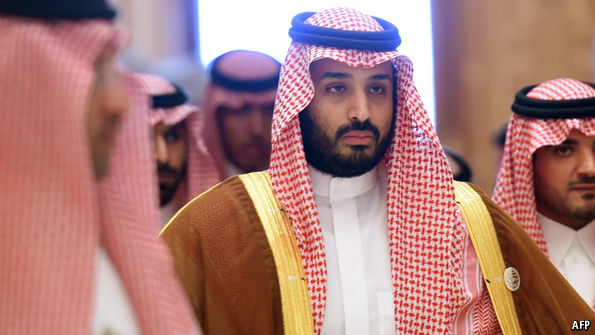BLACKEAGLE
SENIOR MEMBER
Transcript: Interview with Muhammad bin Salman
The Economist meets Saudi Arabia's deputy crown prince, the man who wields power behind the throne of his father, King Salman
Jan 6th 2016 | Diriya | Middle East and Africa

Muhammad bin Salman, Saudi Arabia’s deputy crown prince and the country's defence minister, spoke to The Economist on January 4th. As part of a five-hour conversation, he gave his first on-the-record interview, which we have transcribed below. Our briefing includes quotations from both this and the broader discussion. Our cover leader is available here and more analysis on a possible Aramco listing is here.
The Economist: Let’s focus first on the recent executions. Why did they take place now, so many years after the terrorist attacks in Saudi Arabia? And why did you include a prominent shia cleric?
Muhammad bin Salman: First of all, these were sentenced in a court of law with charges related to terrorism and they went through three layers of judicial proceedings. They had the right to hire an attorney and they had attorneys present throughout each layer of the proceedings. The court doors were also open for any media people and journalists, and all the proceedings and the judicial texts were made public. And the court did not, at all, make any distinction between whether or not a person is Shi’ite or Sunni. They are reviewing a crime, and a procedure, and a trial, and a sentence, and carrying out the sentence.
But these executions have provoked violent reactions in Iran. Your embassy was attacked, you’ve broken off diplomatic relations, as have Bahrain and Sudan. What will be the consequence of this escalation of regional tensions?
We view them as a strange thing, that there are demonstrations against Saudi Arabia in Iran. What is the relationship between a Saudi citizen who committed a crime in Saudi Arabia, and a decision made by a Saudi court. What has this to do with Iran? If this proves anything it proves that Iran is keen on extending its influence over the countries of the region.
Did you not unfairly escalate tensions by breaking off diplomatic relations?
On the contrary, we fear that they will be further escalated. Imagine if any Saudi diplomat, or one of their families or children are attacked in Iran. Iran’s position then will be much more difficult. So we prevented Iran from having to undergo such an embarrassment. The Saudi mission was set ablaze and the Iranian government is watching. If a child, or a diplomat, or their families are attacked, what could happen? Then we will have the real conflict and the real escalation.
Are you suggesting conflict between Iran and Saudi Arabia, outright conflict, is a possibility?
Because of this procedure?
And the consequences thereof.
If it’s because of this procedure I don’t believe that this could be a cause to further any tension between Saudi Arabia and Iran. Because Iranian escalation has already reached very high levels and we try as hard as we can to not escalate anything further, we only deal with the procedures and steps taken against us.
Is war between your two countries, direct war, possible?
It is something that we do not foresee at all, and whoever is pushing towards that is somebody who is not in their right mind. Because a war between Saudi Arabia and Iran is the beginning of a major catastrophe in the region, and it will reflect very strongly on the rest of the world. For sure we will not allow any such thing.
Do you consider Iran to be your biggest enemy?
We hope not.
One area where there might be considered to be what you might call proxy conflict between you is Yemen. You are the architect of the war in Yemen; when will it end?
First of all I’m not the architect of the Yemen operation. We are a country of institutions. The decision to proceed with the operation in Yemen, this is a decision to do with the Ministry of Foreign Affairs, the Ministry of Defence, with the intelligence, the council of ministers, and the council of security and political affairs, and then all recommendations are submitted to His Majesty, and the decision to go forward is with His Majesty. My job as the minister of defence is to implement whatever decision his majesty has ordered. And I will submit any threats that I see. And to make preparations for any threats.
The decision was taken soon after you became defence minister. When do you expect the operation to finish?
Regarding the fact that the decision was made after I became minister of defence, why did we forget the fact that Houthis usurped power in the capital, Sana’a, after His Majesty became king? This has nothing to do with the fact that I became minister. It has everything to do with what the Houthis did. I have surface-to-surface missiles right now on my borders, only 30-50 km away from my borders, the range of these missiles could reach 550km, owned by militia, and militia carrying out exercises on my borders, and militia in control of warplanes, for the first time in history, right on my borders, and these war planes that are controlled by the militia carry out activities against their own people in Aden. Is there any country in the world who would accept the fact that a militia with this kind of armament should be on their borders? Especially that they dealt with total disregard of UN Security Council resolutions, and posed a direct threat to our national interests. And we had a previous experience, a bad experience with them back in 2009. The operations carried out were supported and upheld by the UN Security Council, without any opposition.
The Economist meets Saudi Arabia's deputy crown prince, the man who wields power behind the throne of his father, King Salman
Jan 6th 2016 | Diriya | Middle East and Africa

Muhammad bin Salman, Saudi Arabia’s deputy crown prince and the country's defence minister, spoke to The Economist on January 4th. As part of a five-hour conversation, he gave his first on-the-record interview, which we have transcribed below. Our briefing includes quotations from both this and the broader discussion. Our cover leader is available here and more analysis on a possible Aramco listing is here.
The Economist: Let’s focus first on the recent executions. Why did they take place now, so many years after the terrorist attacks in Saudi Arabia? And why did you include a prominent shia cleric?
Muhammad bin Salman: First of all, these were sentenced in a court of law with charges related to terrorism and they went through three layers of judicial proceedings. They had the right to hire an attorney and they had attorneys present throughout each layer of the proceedings. The court doors were also open for any media people and journalists, and all the proceedings and the judicial texts were made public. And the court did not, at all, make any distinction between whether or not a person is Shi’ite or Sunni. They are reviewing a crime, and a procedure, and a trial, and a sentence, and carrying out the sentence.
But these executions have provoked violent reactions in Iran. Your embassy was attacked, you’ve broken off diplomatic relations, as have Bahrain and Sudan. What will be the consequence of this escalation of regional tensions?
We view them as a strange thing, that there are demonstrations against Saudi Arabia in Iran. What is the relationship between a Saudi citizen who committed a crime in Saudi Arabia, and a decision made by a Saudi court. What has this to do with Iran? If this proves anything it proves that Iran is keen on extending its influence over the countries of the region.
Did you not unfairly escalate tensions by breaking off diplomatic relations?
On the contrary, we fear that they will be further escalated. Imagine if any Saudi diplomat, or one of their families or children are attacked in Iran. Iran’s position then will be much more difficult. So we prevented Iran from having to undergo such an embarrassment. The Saudi mission was set ablaze and the Iranian government is watching. If a child, or a diplomat, or their families are attacked, what could happen? Then we will have the real conflict and the real escalation.
Are you suggesting conflict between Iran and Saudi Arabia, outright conflict, is a possibility?
Because of this procedure?
And the consequences thereof.
If it’s because of this procedure I don’t believe that this could be a cause to further any tension between Saudi Arabia and Iran. Because Iranian escalation has already reached very high levels and we try as hard as we can to not escalate anything further, we only deal with the procedures and steps taken against us.
Is war between your two countries, direct war, possible?
It is something that we do not foresee at all, and whoever is pushing towards that is somebody who is not in their right mind. Because a war between Saudi Arabia and Iran is the beginning of a major catastrophe in the region, and it will reflect very strongly on the rest of the world. For sure we will not allow any such thing.
Do you consider Iran to be your biggest enemy?
We hope not.
One area where there might be considered to be what you might call proxy conflict between you is Yemen. You are the architect of the war in Yemen; when will it end?
First of all I’m not the architect of the Yemen operation. We are a country of institutions. The decision to proceed with the operation in Yemen, this is a decision to do with the Ministry of Foreign Affairs, the Ministry of Defence, with the intelligence, the council of ministers, and the council of security and political affairs, and then all recommendations are submitted to His Majesty, and the decision to go forward is with His Majesty. My job as the minister of defence is to implement whatever decision his majesty has ordered. And I will submit any threats that I see. And to make preparations for any threats.
The decision was taken soon after you became defence minister. When do you expect the operation to finish?
Regarding the fact that the decision was made after I became minister of defence, why did we forget the fact that Houthis usurped power in the capital, Sana’a, after His Majesty became king? This has nothing to do with the fact that I became minister. It has everything to do with what the Houthis did. I have surface-to-surface missiles right now on my borders, only 30-50 km away from my borders, the range of these missiles could reach 550km, owned by militia, and militia carrying out exercises on my borders, and militia in control of warplanes, for the first time in history, right on my borders, and these war planes that are controlled by the militia carry out activities against their own people in Aden. Is there any country in the world who would accept the fact that a militia with this kind of armament should be on their borders? Especially that they dealt with total disregard of UN Security Council resolutions, and posed a direct threat to our national interests. And we had a previous experience, a bad experience with them back in 2009. The operations carried out were supported and upheld by the UN Security Council, without any opposition.


